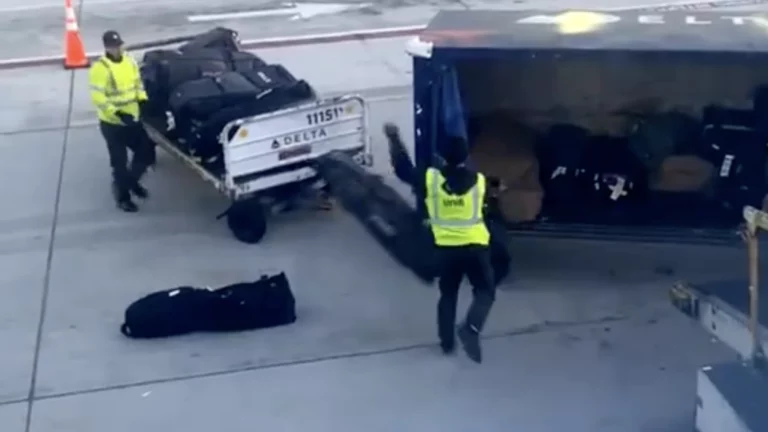Delta Airlines recently found itself at the center of a social media storm after the East Tennessee State University (ETSU) golf team posted a video exposing the mishandling of their golf equipment by airline employees. The ETSU golf team, known for its competitive spirit and recent successes, was en route to the NCAA Championships in Carlsbad, California, when they encountered an incident that could have jeopardized their performance.
The team, coming off a strong second-place finish at the NCAA Chapel Hill Regionals in North Carolina, was hopeful and excited as they boarded their flight to California. However, their journey took an unexpected turn when they witnessed their golf clubs being carelessly handled by Delta employees. The viral video, recorded by an unidentified passenger, shows Delta staff hurling the team’s precious golf clubs onto the tarmac, an act that sparked outrage among fans and the general public.
Delta Airlines: The Incident and Its Immediate Fallout
On May 22, 2024, the ETSU golf team’s official X account shared the shocking footage, which quickly garnered around 3.5 million views, 2,600 reposts, and 1,400 comments within the first 12 hours. The tweet read, “Nice of @Delta to handle our clubs with such care…” and featured the disheartening video of the equipment being mistreated.
Delta Airlines, faced with growing backlash, issued a statement the following day:
“We apologize to the ETSU Golf team and ask for a mulligan on how their equipment was handled. We’re in direct contact with the Bucs to ensure they have what they need to successfully compete in the NCAAs.”
Despite this apology, the response did little to quell the anger of fans and social media users, who continued to criticize Delta Airlines for their apparent lack of care and respect for the team’s equipment.
The video showing Delta staff mishandling their clubs struck a chord with many, not only because of the potential damage to the equipment but also due to the disrespect it implied. Golf equipment, particularly at the collegiate level, is highly specialized and often expensive, making its proper handling crucial for the athletes’ performance.
Delta Airlines’ response to the incident has been widely criticized for its perceived insensitivity and reliance on automated systems. The airline’s initial apology, coupled with a request for a “mulligan,” was seen as tone-deaf by many, especially given the gravity of the situation. Furthermore, the use of AI-generated responses in addressing the complaints on social media only added fuel to the fire.
As the video continued to circulate, Delta Support’s comments on X appeared automated and lacked genuine empathy, further enraging users. One comment read “@Delta UNACCEPTABLE! Why the silence?” (@ScottyGman23), while another stated “Stock so far down @Delta. You need to respond and assure the rest of us who travel with our clubs that you find this completely unacceptable and [that] these guys were appropriately disciplined. Silence tells us you don’t care & if we’re traveling with our clubs we better book elsewhere” (Chris Mascaro).
The reliance on AI for customer service has become a growing trend, aimed at efficiency but often falling short in situations requiring a personal touch. Delta Airlines’ use of AI in this scenario has been criticized for its inability to address the unique concerns and emotions of affected customers, highlighting the limitations of automation in customer service.
This is not the first time Delta has been involved in incidents involving high-profile golfers. Days before the start of the 2023 Solheim Cup, American star Danielle Kang traveled with Delta, only to discover that her golf bag had not arrived with her in Spain. Kang had to play her first practice rounds with someone else’s set of clubs and was in danger of having to compete without her personal equipment.
The incident involving the ETSU Golf Team and Delta Airlines brings to light broader issues regarding customer service and the handling of special equipment by airlines. It underscores the importance of proper training and protocols for baggage handlers, especially when dealing with valuable and sensitive items such as sports equipment.
The ETSU Golf Team’s experience with Delta Airlines is a vivid example of the challenges faced by travelers, particularly those carrying specialized equipment. The viral video and subsequent fallout have put a spotlight on the importance of proper baggage handling and the limitations of AI in customer service.
As the ETSU Golf Team prepares to compete in the NCAA Championships, they do so with the support and sympathy of a public outraged by the mistreatment of their equipment. Delta Airlines, on the other hand, faces a critical moment of introspection and the need to improve their handling procedures and customer service protocols.


